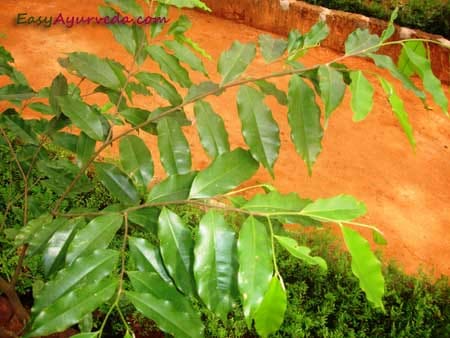Agaru plant grows as a tree replete with wonderful fragrance. Being used as an aromatic plant since ancient times, the tree along with other aromatic plants has been termed as ‘spirit of life’ in the Vedas. In seventeenth century the bark of the Agaru tree was used to pen down the great epic of Ramayana.
Agaru which is the Sanskrit name of the plant is called Aloes tree in English. Its scientific name is Aquilaria agallocha or Aquilaria malaccensis . It is known as Agar in Hindi. Due to its extensive usage, the plant has been listed under the Critically Endangered category in the IUCN red list.
Plant Anatomy And Distribution
Belonging to the family Thymelaeceae, Agaru plant is a very important plant according to Ayurveda because of its healing properties. It can be consumed as well as applied externally to get rid from a number of medical conditions.
The tree grows very tall, up to the height of about 60 to 80 feet with its bark ranging from 3 to 4 feet in diameter. Since the bark is thin in stature, it was used in the earlier times for writing. The bark of agaru emanates a pleasant aroma which is why it is used to make aromatic products like perfumes. This aroma is due to the presence of a substance called oleoresin. The fungus Phaeoacremonium parasiticum infects a few agaru tress and leads to a release of a special fragrance. In fact it is the infected part of the trees which is used to make the special agarwood oil.
Aquilaria agallocha is one of the species of Aquilaria. The leaves of the plant are thin and leathery and can be about three inches long. Flowers are white in colour and fruits are approximately 2 inches long and are smooth from the outside.
The agaru tree is considered as native to South East Asia and is found in India, Bhutan, Bangladesh, Indonesia, Myanmar, Malaysia, Philippines, Singapore, Thailand and Laos. A special property of this tree is that it is quite adaptable and can even grow in polluted areas.
According to Raja Nighantu, there are four types of Agaru:
- Kaashth Agaru – This type of agaru is yellowish in colour. It can be useful in curing neurological disorders and vomiting.
- Krishna Agaru – This agaru is useful in curing disorders related to skin, eyes and ears.
- Mangalya Agaru – This agaru is considered as the best of all types. It is more voluminous and easily sinks in water. Found in the Himalayan region, especially near Kedarnath, Mangalya Agaru is famous for its many therapeutic benefits. This type is known as Garki agaru in the traditional Unani medicine.
- Daaha Agaru – Also known as Tail Agaru, it can be found growing in Gujarat in India. It is known for its pleasant fragrance and is quite useful in hair related problems.
A shloka on agaru:

Agaru Plant: Uses And Properties
Apart from being used as a traditional medicinal herb, it has a number of other uses too like:
- It is used to make furniture. But being pricy and rare, the furniture made with agarwood is quite expensive.
- It is used in the manufacturing of a number of aromatic products like perfumes, incense sticks etc.
The medicinal properties are:
- Anti asthmatic
- Anti inflammatory
- Anti microbial
- Anti atherogenic
- Anti hyperlipidemic
- Anti diarrheal
- Anti dysentery
- Anti thrombotic
- Analgesic
- Carminative
- Cholagogue
- Demulcent
- Deobstruent
- Aromatic
- Aphrodisiac
- Depurative
- Digestive
- Rejuvenating
- Nervine
- Sedative
- Cardiac Stimulant
- Tonic
- Nervine tonic
The health conditions in which it can prove to be beneficial are:
- Asthma
- Loss of appetite
- Bronchitis
- Intestinal worms
- Diarrhea
- Dysentery
- Body and mouth odour
- Bradycardia and other heart related conditions
- High blood pressure
- Gout
- Rheumatism
- Anxiety
- Depression

Ayurvedic Properties Or Gunadharma
- Physical property (Guna) – light (laghu), dry (rooksha) and tikshna (sharp)
- Taste (Rasa) – katu (pungent) and tikta (bitter)
- Potency (Veerya) – ushna or hot
- Conversion after digestion (Vipaka) – pungent after digestion
- Effect on doshas – agaru helps in pacifying Vata and Kapha doshas.
Consuming agaru generates heat in the body whereas external application provides a cooling effect.
Ayurvedic Classification / Classical Reference
Charaka classifies Agaru as:
- Tikta Skandha – group of herbs that have a bitter taste
- Sheeta Prashamana – group of herbs that relieve coldness
- Shiro Virechanopaga – group of herbs that are used in the Nasya therapy
- Shvashara – group of herbs useful in respiratory system disorders
Sushruta classifies Agaru as:
- Eladi Gana – group of herbs useful in curing skin related conditions
- Salasaradi Gana – group of herbs useful in fighting Jaundice
AGARWOOD
Agarwood is the dark and fragrant resinous wood obtained from the heartwood of the aquilaria trees. Aquilaria is a genus of a total fifteen trees out of which Agaru is one. The trees yield perfumed dark wood after being affected by a mould, prior to which they bear no smell.
According to one of the legends, agarwood has been called as the ‘wood of the God.’ It is said that when Adam and Eve were forcibly pushed out of the Garden of Eden, the only thing they were permitted to take with them was the agarwood tree. The fragrance of the tree is considered as the most captivating fragrance ever and forms a part of many cultures and traditions. Finding mention in numerous Ayurvedic texts like Charaka Samhita and Sushruta Samhita, Agarwood fragrance has even been called the favourite fragrance of Lord Krishna in Bhagwad Gita. Buddha had termed it as the scent of Nirvana.
Agarwood oil / Agaru Oil
There are a total of seventeen species of genus Aquilaria out of which only eight are known to produce agar oil. Agarwood oil is created due to the reaction of fungus and oleoresin present in the tree. The fungus infected area is a special region producing a unique fragrance.
Agarwood oil is especially famous in China, Japan and the Middle Eastern countries. The oil is quite expensive due to the complicated process through which it is extracted. About 100 kg of Agarwood yields a meager 30 ml Agarwood oil. The oil is often priced at the same price as that of 24 carat Gold.
Agaru Plant Benefits
Helpful In Respiratory Disorders
Agaru is an anti inflammatory herb and hence can help relieve the inflammation of the lungs too. In bronchitis, there is inflammation as well as irritation in the bronchial tubes. Ayurveda calls bronchitis a Kasroga and says that it is caused due to the accumulation of toxins or ama in the body. This ama gets accumulated in the body because of poor digestion and incomplete elimination of waste from the body. Finally this ama takes the form of mucus in the lungs and causes respiratory issues. Consuming the herb helps in better digestion and being hot in nature, it also removes the excess mucus from the respiratory tract. Agaru is also helpful in the treatment of Asthma.
Suggested Remedy: In case of respiratory disorders or excess buildup of cough in the body, combine half a teaspoon agaru powder or churna with honey and consume this mixture after having food. Repeat it daily till relieved of the issue.
Can Relieve Fever, Cough And Cold
Helpful in clearing mucus, Agaru is also quite beneficial in fighting the common flu. It helps in not suppressing but clearing off the symptoms of fever like chills, tiredness and dryness of mouth. It further clears the air passages by freeing the lungs of the accumulated mucus. The decoction or kwath of Agaru is quite helpful in fighting fever and even helps in removing the fatigue.
Suggested Remedy: To prepare Agaru kwath or decoction, add around 5 gram Agaru powder in 250 ml water and boil till the decoction comes down to 60 ml. This kwath should be consumed till the symptoms persist.
Yet another remedy is to consume a combination of 1 gram Agaru powder, half a gram trikatu churna with laung powder, honey and crushed ginger juice.
Get Rid Of Bodily Weakness And Regain Strength
When affected by fever or any other illness, our immune system strives hard to clear our body of all the infectious pathogens and restore normality. However in this process, the body loses a huge amount of energy. Since we are not even able to consume rich foods along with suffering from a poor appetite, they body suffers from debility and loss of strength. Agaru is one of those herbs which helps the body regain the lost strength and even helps in building additional strength by proper absorption of nutrients.
Suggested Remedy: Consuming a mixture of Agaru powder, giloy powder, shatavari powder and ashwagandha powder mixed in an equal ratio can help the body immensely by getting rid of fatigue and improving energy levels. This mixture should be consumed twice a day with milk for best results.
In Loss Of Appetite
When the Agni or fire of digestion is weak, it leads to loss of appetite. There is an aggravation of Vata, Pitta as well as Kapha doshas which causes incomplete digestion of food and hence poor absorption of nutrients.
Haemorrhoids
Haemorrhoids, commonly known as Piles are a disorder of the rectum and the anus. The veins get swollen and inflamed and sometimes even a bacterial infection occurs in the gaps. This causes painful stools and also bleeding. The herb powder can be helpful in the treatment of piles.
Suggested Remedy: Consume agaru powder with mishri and ghee twice a day with lukewarm milk for relief.
Excessive Thirst Or Persistent Hiccups
Be it excessive thirst or persistent hiccups, the herb can prove to be quite helpful in providing relief from these conditions. Consuming the powder or churna with honey in short intervals can help in putting a full stop to incessant hiccups. To put an end to excessive thirst which no amount of water can relieve, it is recommended to make a decoction of agaru powder and cardamom powder and consume this decoction with a munakka (Sultana currant).
Stomach Issues
Agaru does not only enhance appetite and promote better nutrient absorption but it is also a boon for our digestive systems. When consumed with Jeera (cumin seeds) and ajwain (carom seeds), agaru powder helps in relieving bloating, gas formation and stomach aches. Agaru also has anti diarrheal and anti microbial properties and can help in providing quick relief from diarrhea. Being anti microbial in nature also means that it helps in saving the stomach against a number of other microbial infections too.
Disorders Related To The Nervous System
Agaru is extremely beneficial in treating disorders related to the nervous system. It can help provide relief from excess anxiety, stress and even depression. Anxiety and stress if not controlled in time can lead to other serious issues in the physical. It also helps in balancing the Vata dosha and help in reducing any sensation of numbness and tingling in the body.
Bad Breath
Bad breath is also known as halitosis and it is certainly not one of those problems that one must ignore. There might be an underlying disease of the gums which might be causing this issue and one must definitely take it as a red flag. Agaru turns out to be one of the best herbs used for the treatment of halitosis. The herb has anti microbial and anti inflammatory properties and therefore it helps in clearing any kind of infection. Apart from this, its unique aromatic property helps in providing a fresh smell to the mouth. Meagerly chewing stems of the agaru tree can prove to be quite beneficial.
Urinary Disorders
If you are suffering with any of the disorders related to the urinary tract or any other problems with passing the urine, Agaru should be your herb of choice. Many people suffer with the issue of bedwetting or chylous urine in which the urine passed is white in colour. Consuming agaru in combination with certain other herbs can prove to be helpful in the treatment of these conditions.
Suggested Remedy: If someone is suffering with bedwetting disorder, they must be given a combination of agaru powder, brahmi powder, haritaki powder and vaividang powder. These churnas must be mixed in an equal ratio and the mixture must be consumed two to three times a day with honey.
Benefits Of Agarwood Oil
Anti Inflammatory
Agarwood oil has anti inflammatory and analgesic properties. This makes it quite beneficial in providing relief from swellings and pains. It is especially useful in joint related problems. Agarwood oil also has anti arthritic properties and applying it on the affected area can relieve the swelling and pain. It even is diuretic in nature and can help prevent the accumulation of uric acid which is the cause behind painful gout.
Suggested Remedy: Use two drops of agarwood oil in combination with coconut oil or any other available oil and massage the affected area.
Anti Cancer
Agarwood oil also has anti cancer properties and one of the studies revels that it helped inhibit the formation of breast cancer cells.
For Amazing Skin
Agarwood oil is not only famous for its fragrance but it is also quite beneficial for the skin. Being anti inflammatory in nature it can help cure a number of skin conditions like acne breakout because it is mostly inflammation of the skin which causes these problems. Also its anti microbial properties ensure that microbes do not sit for long on the skin thus preventing any infections. One can mix a few drops of the oil in their daily skin cream and apply regularly.
Menstruation Problems
One of the best properties of this oil is that it can help in balancing the hormones of the body without causing any kind of side effects. It can prove to be beneficial for women approaching menopause and suppress the symptoms to a good extent. Agarwood oil can also help lessen stomach cramps, providing relief from painful menstruation. It even alleviates the symptoms of PMS like breast tenderness and mood swings.
Recommended Dosage
The general dosage of agaru is:
- For children – 125 to 500 mg
- For adults – 500 to 1875 mg
- Agarwood oil – 1 to 5 drops
A maximum of 6 gram can be consumed in a day in divided doses. It is best to consume after food along with lukewarm water or milk.
Side Effects And Precautions
Agaru as an Ayurvedic herb is considered likely safe if consumed only within the recommended dosage limit. So usually there are not any notable side effects. However, people who have a Pitta body type need to take care as agaru consumption can cause:
- It might generate too much heat in the body.
- It can cause stomach related issues, especially acidity.
These side effects are majorly experienced only by those who consume Agaru in excess.
Although agaru is considered safe for pregnant and lactating women, they are recommended to consult their doctors before consuming. A doctor’s recommendation should also be obtained by all those who are consuming it in combination with allopathic medicines, other herbs or health supplements.
Did you find this post useful? Would you like to get back to it later? Save THIS PIN below to your Pinterest Ayurveda or Herbs board!

